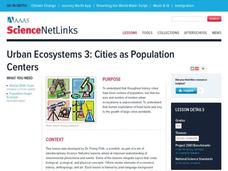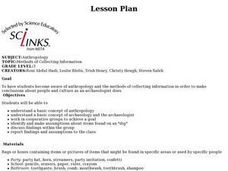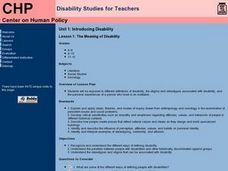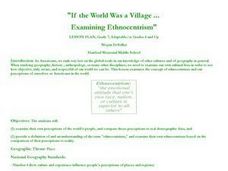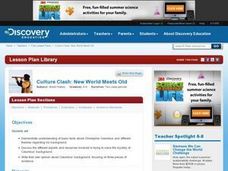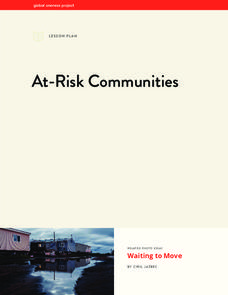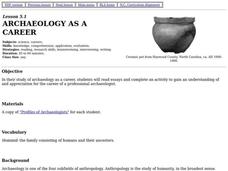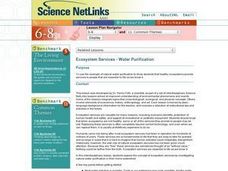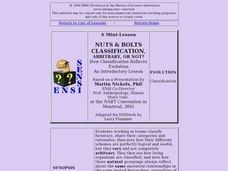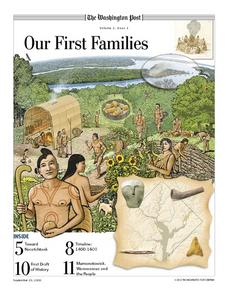Curated OER
Water Purification
Students use the example of natural water purification to show that healthy ecosystems provide services to people that are essential to life as we know it.
Curated OER
Hominid Traits: Ape to Man
Twelfth graders collaborate and analyze information about our hominid lineage. They discuss evidence researched by anthropologists. Students use spreadsheet data to compare means of locomotion, diet and brain size.
Curated OER
Shadows of North Carolina's Past
Students construct a timeline of four major culture periods in Native American history from studying archaeological evidence cards.
Curated OER
Urban Ecosystems 3: Cities as Population Centers
Students discover that throughout history cities have been centers of population but that human exploitation of fossil fuels was key to the growth of large cities worldwide. They research urban growth through a number of websites.
Curated OER
Pharaoh Phonetics
Students explain the purpose of hieroglyphics and identify their role in communicating ideas. They research the history of writing and it's significance in ancient Egyptian life and identify the components of hieroglyphics.
National Endowment for the Humanities
Folklore in Zora Neale Hurston's Their Eyes Were Watching God
Learners define folklore, folk groups, tradition, and oral narrative. They identify traditional elements in Their Eyes Were Watching God Analyze and understand the role of traditional folkways and folk speech in the overall literary...
Curated OER
Creating a Pot: Repetition as a Unifying Design Element
Students use subjects, themes, and symbols that demonstrate knowledge of contexts, values, and aesthetics that communicate intended meaning in artworks.
Curated OER
Culture Everywhere
Students study their culture while filling in a chart that shows how culture meets basic human needs. They examine the role of archaeologists in studying people from past cultures.
Curated OER
Methods of Collecting Information
Third graders examine a bag or box of soil containing items that they dig for. Their task is to become detectives to make conclusions about the area from which the items came as real archaeologists do.
Curated OER
The Meaning of Disability
Students discover the different types of disabilities. They examine the stereotypes and stigmas associated with them and hear from a person who lived in an institution.
Curated OER
If the World Was a Village...Examining Ethnocentrism
Seventh graders examine their own perceptions of world's people, compare those perceptions to real demographic data, provide definition and understanding of term "ethnocentrism," and examine their own ethnocentrism based on comparison of...
Curated OER
New World Meets Old
Students demonstrate understanding of basic facts about Christopher Columbus and different theories regarding his background. They try to solve the mystery of Christopher Columbus' background and write an essay offering their own opinion.
Curated OER
WOMEN'S AND MEN'S ROLES IN DIFFERENT CULTURES
Students examine careers that are not traditional to their gender.
Global Oneness Project
The Value of Ancient Traditions
Imagine having to give up cell phones, computers, and TV? What would be lost? What gained? An examination of the Drokpa, a nomadic people who live in the grasslands of Tibet, provides class members an opportunity to consider how access...
Global Oneness Project
Citizen Photojournalism
Matt Black's photo essay, "The Geography of Poverty" provides a shocking reminder of the poverty that exists in the United States. The resource not only focuses attention on poverty but also conditions that have given rise to situation...
University of Chicago
Comparing Modern and Ancient Ideas of Ethnicity and Identity
Explore ethnicity and identity with a research and writing assignment. Class members conduct online research, looking in particular at images and carefully noting down their sources on notecards. They read about identity and compose...
Global Oneness Project
At-Risk Communities
"Waiting to Move," a photo essay by Ciril Jazbec, brings into sharp focus the threats posed by climate change. Class members examine images of Shishmaref Island and the Native Alaskan Inupiate coastal villages that are impacted by rising...
Curated OER
Archaeology as a Career
Fourth graders read about archaeology as a career. They develop a list of questions they would like to ask an archaeologist and then actually interview an archaeologist on the future of archaeology as a career.
Curated OER
I Heard the Owl Call My Name
Eleventh graders write a two to three page paper addressing one of the following topics: Analyze the values and beliefs of the two conflicting cultures. Explain which values seem to dominate within the conflict and why. They brainstorm...
Curated OER
Ecosytems: Water Purification
Middle schoolers explore how ecosystems purify water and what kinds of things humans do that alter these processes. They use a website to access information on local watersheds and develop a "river" newspaper
Curated OER
Nuts & Bolts: is Classification, Arbitrary, Or Not?
Middle schoolers, in groups, classify furniture, share their categories and rationales, then note how their different schemes vary, perfectly logical and useful, but completely arbitrary.
Curated OER
Stories of the Wrights' Flight
Students examine and compare primary and secondary source accounts of the Wright brothers' first flights on December 17, 1903.
Curated OER
Revolutionary Money
Examine paper money from the American revolution! Historians study the paper bills and discuss the history of money. How has money changed over the times? Activities are included.
Curated OER
Our First Families
Students complete a variety of activities in which the Washington Post Newspaper is used to reinforce concepts pertaining to the history of the Washington, D.C. area.





